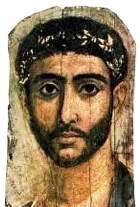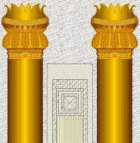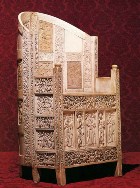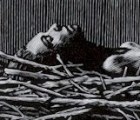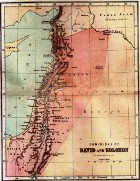Israel united: a kingdom at last
After they entered the Promised Land, the Israelite tribes were governed by their tribal leaders. They were linked by culture and religion, but apart from that each tribe governed itself.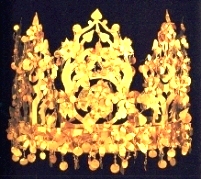
Then things changed. In about 1000 BC the charismatic leaders Saul, David, and Solomon formed the tribes into a unified nation governed by kings.
Some of these kings were good, some were not.
King David heads the list
What sort of a man was David?
David had the gift of charming people and making them love him.
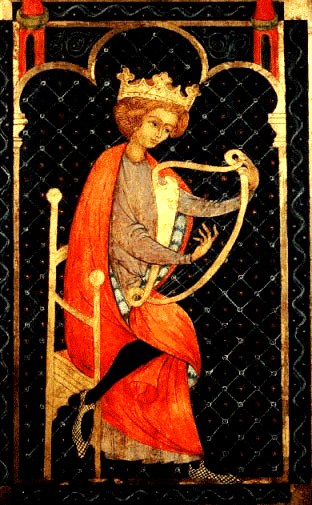
Medieval manuscript showing David playing the lyre
No other king could match him for verve, charisma and all the contradictory qualities of a real human being.
- He was wise and foolish, merciful and cruel, forgiving and ruthless.
- He loved his friends and then betrayed them.
- He used women callously but also seems to have truly loved them.
- He spoilt his children and paid the price for this foolishness.
Duplicitous. God-fearing. Unscrupulous. Charming. Cunning. Beloved. That was David.
Even as a young man, David had the knack of getting noticed by powerful people, of being in the right place at the right time. The prime example of this is his fight with Goliath – a story the Israelites loved because like David they too were poorly equipped and outnumbered by their Philistine enemies. See Warrior v. warrior: famous fights in the Bible
David’s story
Ousted from the royal court of King Saul (one of the great tragic figures of the Bible), David became a brigand who eventually stole the throne. He married women when they could help him, then abandoned them when they became a burden – except for the lovely Bathsheba, who was just as clever as he was.
then abandoned them when they became a burden – except for the lovely Bathsheba, who was just as clever as he was.
David had the qualities of a great leader: he could rally people to his side in a crisis, make them believe in him, carry him to victory. He managed to unify a group of disparate tribes into something resembling a nation, and is called the founder of the ancient kingdom of Israel.
His sons fought over the spoils, rebelling against his authority, so that in the end he was at the mercy of his own family.
Ahab’s name was blackened in the Bible
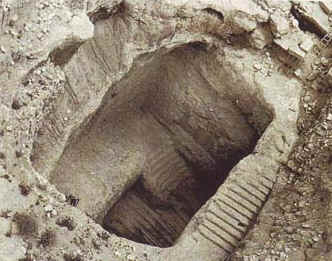
Massive water system at Hazor, probably built during the reign of Ahab. Five flights of steps lead down to a tunnel which reaches the water table
even though he was one of the most successful kings of ancient Israel. He did not favour the Yahwist priesthood over the mysterious agricultural gods and goddesses, but tried to reconcile them, to get them to live together side by side – something the Bible suggests he failed to achieve.
He completed work on the new capital at Samaria begun by his father, and is credited with building the fabled Ivory House, as well as a number of cities and fortifications throughout Israel – among them Hazor and Megiddo. These included elaborate water systems that could withstand any siege.
Archaeologists found 12,000 pieces of carved ivory in the burned ruins at Samaria. They had been used on furniture and walls of the palace
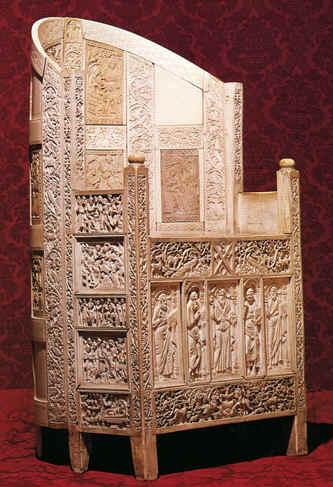
Archaeologists found 12,000 pieces of carved ivory in the burned ruins of the palace at Samaria, which is why it was called the ‘Ivory House’. The throne above, though from a later period, shows how ivory plaques were used to decorate furniture and walls in ancient palaces
The large number of deadly chariots of war and soldiers listed in the Assyrian records show that Ahab had a formidable army. He probably used this against troublesome neighbours such as Moab, and Judah may also have been under his control.
He continued his father Omri’s astute policy of alliances with other small states, often through marriage – Queen Jezebel, his wife from Sidon, probably brought the rich Mount Carmel area as her dowry. So despite the Bible’s negative portrayal of Jezebel, Israel probably did very well out of the deal, thank-you.
In religious matters, Ahab was a pragmatist. He encouraged tolerance for his wife’s (and many Israelites’) religion which centred on the rain god Baal, a popular deity among farmers.
The Bible criticizes him for the confiscation of Naboth’s vineyard, which flouted traditional ownership of land, but Ahab’s high-handed behaviour fits with an autocratic system of strong leadership accompanied by economic prosperity and new (though not necessarily better) ways of doing things.
He died fighting bravely in the battle at Ramoth-gilead, and was buried in his city of Samaria, as he would have wished.
Jehoram’s brother ‘fell’ from a balcony
in the palace, and so Jehoram succeeded to the throne of Israel.
He was not the son of Jezebel for nothing.
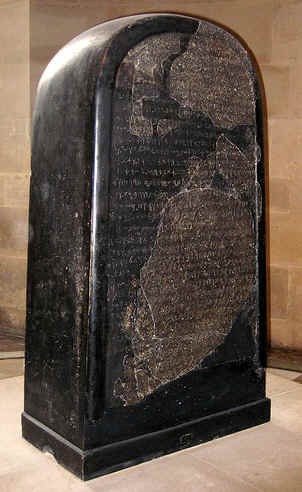
The Mesha Stele. ‘I am Mesha, the king of Moab. My father was king over Moab for thirty years, and I was king after my father. Omri was the king of Israel, and he oppressed Moab for many days. And his son reigned in his place; and he also said, “I will oppress Moab!” But Israel has been defeated; it has been defeated forever!’ (Edited translation)
He was king of the northern kingdom of Israel from about 852-841BC.
The great power at that time was Syria, and Jehoram was seriously wounded fighting the Syrians at Ramoth-gilead, at the same place his father Ahab had been killed – and fighting the same enemy.
Jehoram also fought Mesha, the king of Moab, when Mesha rebelled against Israelite rule after the death of Ahab.
The Bible says Jehoram was successful, but the Mesha Stele (right) tells a different story – see a translation of part of the story under the illustration.
What probably happened was that Jehoram was successful at first, as described in 2 Kings 3, but lost the overall war against Moab.
In any event, there seems to have been growing internal opposition to Jehoram, led by the Yahwist priests, in particular Elisha.
What followed was a coup d’état led by the very unpleasant army captain, Jehu. Jehoram was lured out of the city of Jezreel, where he had been recovering from wounds, then shot with an arrow in his back. His cousin King Ahaziah of Judah was also murdered.
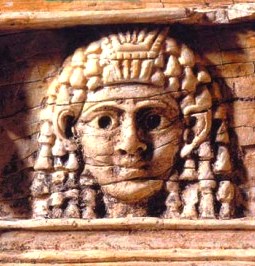
‘The woman at the window’, a sacred Canaanite image
Jehoram’s mother Jezebel, standing above on a tower of the city of Jezreel, saw her son die.
Knowing there was no hope of rescue, she went into the palace, donned the regalia of a queen and high priestess, and went out to face her death.
These people knew how to die.
Bible reference 2 Kings 3; 8-9
Solomon was David’s youngest son
and was therefore ineligible to succeed to the throne. His older brother Adonijah should have taken precedence, and in fact Solomon became king under very questionable circumstances. People assumed Adonijah would succeed King David, but through the machinations of a court clique headed by Solomon’s clever mother Bathsheba he was able to take over power.
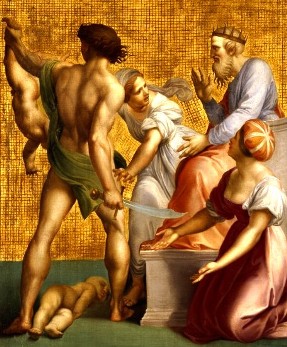
The Judgement of Solomon,
Guiseppe Cades
Soon afterwards he got rid of his brother on trumped up charges. In Adonijah’s trial the main witness against him was Bathsheba, hardly a disinterested witness.
Solomon’s reign was long, prosperous and peaceful – he happened to be king at a time when Egypt and Mesopotamia were having troubles of their own, and these great powers left him alone.
This meant he was able to organize a great building program, and it was at this time that the First Temple was built in Jerusalem.
As well, he built palaces, worship centres and fortifications throughout his kingdom.
He was also an astute administrator, which is part of the reason he was said to have great wisdom. He used diplomacy rather than force to hold his kingdom together. Our politicians could study Solomon more.
The Bible levels some charges against him – that he married far too many women, and foreign women at that, who brought their strange gods with them.
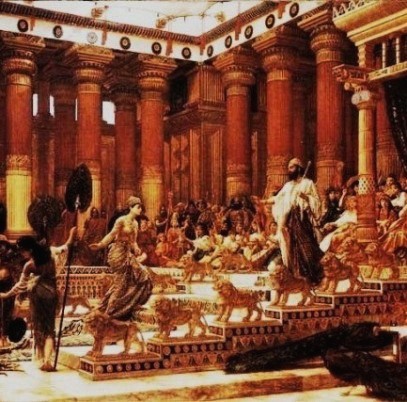
Solomon receives the Queen of Sheba,
Edward John Poynter
Had he been questioned about this, Solomon would have defended himself by saying that each of these women represented an alliance between Israel and the woman’s native country, guaranteeing peace and stability with Israel’s neighbours – see for example the visit of the Queen of Sheba.
The trouble was that Solomon used large amounts of money for his projects, and this meant that people had to pay much more tax. There was also a system of forced labour, to build the temple and palace in Jerusalem and the cities of Hazor, Megiddo and Gezer.
These were deeply resented by ordinary people, and towards the end of his reign the cracks were beginning to show. Revolts broke out. The clock was quietly ticking.
Rehoboam: a kingdom lost
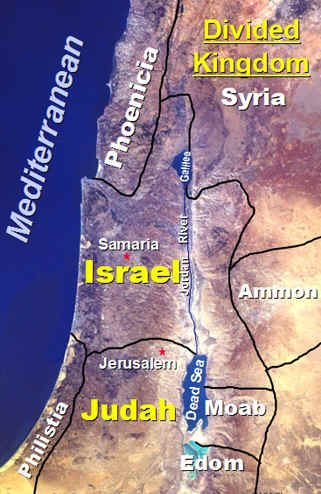 ‘The first generation makes the money, the second learns to spend, the third loses it all…’
‘The first generation makes the money, the second learns to spend, the third loses it all…’
Never was this more true than in the case of King Rehoboam. When he inherited the kingdom from his father King Solomon, it was in trouble. But the young king lost almost all of it, and when the dust settled his once-great kingdom was divided into Israel in the north, which he lost, and Judah in the south, which he kept.
Rehoboam was like Edward VIII of England, the king famous for abdicating the throne in order to marry Wallis Simpson. Like him, Rehoboam was too ready to listen to the counsel of his young sophisticated friends, rather than the sound advice of older, more experienced courtiers.
On the advice of his friends, Rehoboam not only refused to lessen the taxes and forced labour the northern tribes had endured under Solomon, but threatened to increase the burden. In response, the ten tribes rebelled, breaking away and forming their own kingdom in the north. 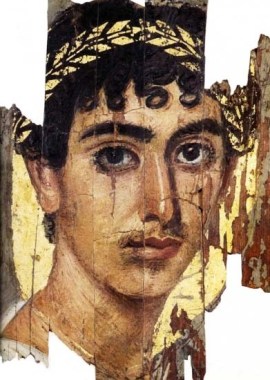
Rehoboam tried repeatedly to re-conquer them, but was never successful.
The other event that blighted Rehoboam’s reign was the raid into Judah of the Egyptian pharaoh Sheshonq I. To buy him off and avert wholesale destruction, Rehoboam had to hand over the treasure of Solomon’s newly-built Temple and of the royal palace.
In short, he inherited a small kingdom but died having lost at least two-thirds of it. He surrendered much of the wealth that Solomon had accumulated during his long reign.
Zedekiah was a puppet king
installed by Nebuchadnezzar in 597BC. The third son of King Josiah, he ruled until the fall of Jerusalem in 587BC, when he suffered a terrible fate. His children were murdered one by one in front of him, and then his eyes were gouged out.
His life seems never to have been easy. The people of Judah did not really accept him as king – they saw him more as a regent, sitting on the throne until their real king came back.
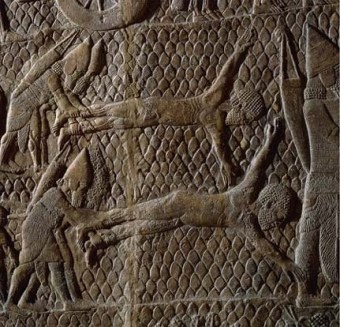
What happened if you rebelled: two prisoners being flayed (skinned) alive
Zediakah was in a difficult situation, dominated by two super-powers who squabbled over his land. The Assyrians who had conquered Judah were stronger, but the Egyptians offered to help him get rid of them. He wavered between the two.
In the fourth year of his reign he went in person to Babylon to show his loyalty, but he also formed a new coalition with Edom, Moab, Ammon and Phoenicia, laying the groundwork for secret plans to rebel.
Nebuchadnezzar seems to have guessed what was happening, because in 588BC he moved his army against Jerusalem and began a siege that finally led to the downfall of the city and the end of the Judean monarchy. The Egyptians tried to help Zedekiah, but one by one his fortresses fell, until only Lachish stood between Nebuchadnezzar and Jerusalem.
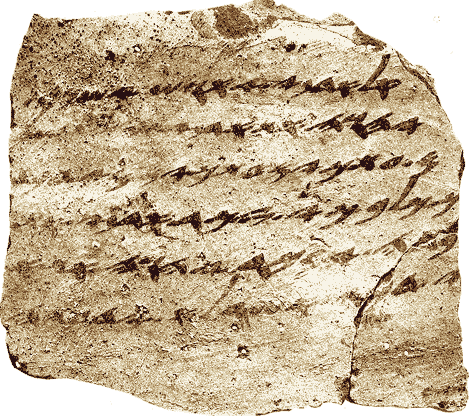
One of the Lachish Letters written on pot shards during
the last desperate days before the city fell to the Babylonians.
What happened at Lachish can be guessed by the broken pieces of pottery known as the Lachish Letters, clay fragments on which were written hastily scrawled letters from Hoshaiah, the commander of an outpost, to the commander of the Judean forces at Lachish. The outpost must have fallen and Lachish went too.
Then it was Jerusalem’s – and Zedekiah’s turn.
Zedekiah fled for his life, but he was captured near Jericho and brought to Nebuchadnezzar’s headquarters near Riblah.There he suffered the agonising experience of watching each of his children murdered, before having his eyes gouged out of his head. Even then he was not allowed to die. He was taken to Babylon in chains along with many other captives, to live in humiliating exile. His eventual fate is unknown.
On this page
KING DAVID had verve, charisma and energy; no king could match him
SOLOMON, David’s son, came to the throne under suspicious circumstances.
He had an older brother…
REHOBOAM ‘The first generation makes money, the second learns to spend it, the third loses it.’
AHAB was black-listed. He did not favour the priests of Yahweh.
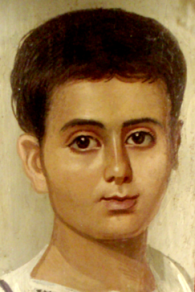
JEHORAM became king after his older brother ‘fell’ from a high balcony. He was not the son of Jezebel for nothing…
JEHU deposed the previous king, killing him and every member of his family…
MANASSEH ruled for fifty-five years, a real achievement. He also has the worst record…
JOSIAH came to the throne when he was eight years old, after his father was assassinated, and he restored the faded glory of the Jerusalem Temple…
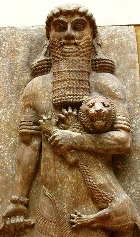
ZEDEKIAH was made a puppet king by fearsome Nebuchadnezzar in 597BC…
__________
Bible kings links
Brutal Jehu founded Israel’s longest dynasty
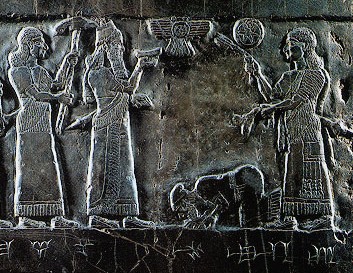
Black obelisk of Shalmaneser
Jehu prostrates himself before Shalmaneser and offers tribute of silver, gold, tin and his own royal staff[/caption]
He was a commander in the Israelite army, and so he was able to take advantage of the situation when Jehoram, already unpopular, was wounded. He deposed the king, killing him and every member of his extended family – see the two sections on Jehu in Bible Murders
The coup, while horrifyingly brutal, seems to have gone off smoothly, probably because Jehoram had been a military failure. He had lost considerable territory in Moab, and been besieged at Samaria by the Syrian army. Jehoram was not the soldier his father had been.
With these setbacks, it is hardly surprising that an ambitious soldier took advantage of the situation by winning over the army and proclaiming himself king.
The conspiracy seems to have been well-planned, and involved the Yahwist priests. According to 2 Kings 9:1-13, the prophet Elisha told one of his followers to travel to Ramoth-gilead and anoint Jehu as king – even though the anointed king Jehoram still lived.
This was done in secret and was blatantly treasonous, but when Jehu gave the other commanders a choice between joining him or dying, they understandably rallied to his cause.
Sad to say, despite his record of appalling violence, Jehu seems to have eventually died a peaceful death…
Manasseh had the longest reign
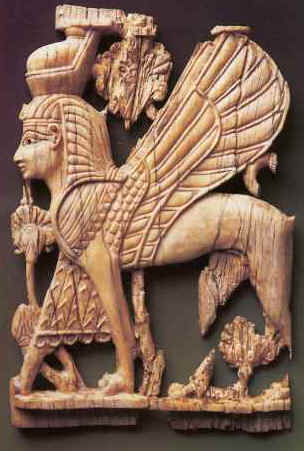
Manasseh allowed worship of images forbidden by the priests of Yahweh but welcomed by Canaanite religions
of any monarch in Israel or Judah. He ruled for fifty-five years, which was a real achievement in those violent days.
He is also the king with the worst record, as far as the writers of the Bible were concerned. They hated him. His great crime was that he aimed at partnership, rather than confrontation, between the Yahwist and Canaanite factions.
- Altars to Baal were erected and
- the image of Ashram appeared in the Temple precincts.
- The religious practices of the agricultural gods were given as much respect as the worship of Yahweh.
This of course was anathema to the biblical writers, who in the Book of Chronicles accuse Manasseh of child sacrifice. Whether this practice ever occurred is debatable: evidence for it is always based on the testimony of enemies – never a reliable source of information.
At one stage of Manasseh’s rule he was carried off to Babylon, probably by Ashurbanipal. The Assyrian texts show that Manasseh was a vassal of Ashurbanipal as early as 667BC, but his deportation suggests that he must have violated his agreement with Ashurbanipal.
He was taken into captivity in hooks and fetters, a punishment meant to humiliate him – which it no doubt did.
There is no way of knowing how long he spent in Babylon. The manner of his death is not recorded.
Bible reference 2 Kings 21:1ff; 2 Chronicles 33
Josiah was one of the great reformers
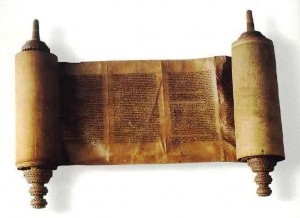 in Jewish history. He was king of Judah shortly before the Exile to Babylon, ruling from 639-609BC.
in Jewish history. He was king of Judah shortly before the Exile to Babylon, ruling from 639-609BC.
Josiah came to the throne when he was eight years old after his father was assassinated, and he ruled for thirty years.
In the eighteenth year of his reign he began to restore the faded glory of the Temple in Jerusalem.
While his workmen were doing this, they are said to have come across a lost set of scrolls – these may have been hidden for safe-keeping during a previous reign, or they may have been a ‘plant’ – at this distance in time it is impossible to tell.
These newly discovered scrolls gave instructions on how the Jewish people were to live, and were read to the assembled Jewish people (or representatives of them). Consequently there was a renewal of faith and religious practice among the Jewish people.
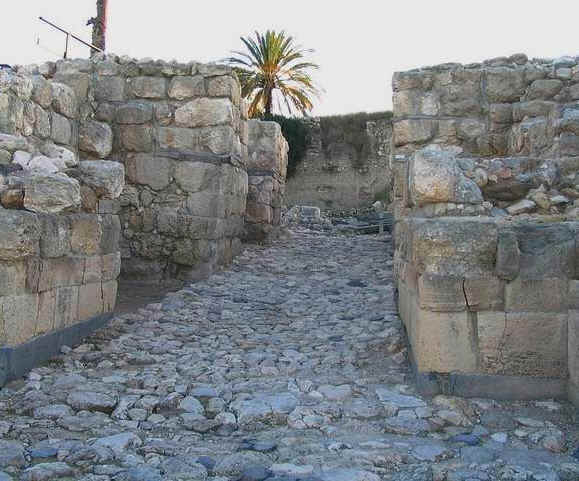
The city gates at Megiddo; Josiah passed through these gates as he went to fight the Egyptian army, where he met his death.
The main point of the reforms was that there was to be only one sanctuary where sacrifice to God could be offered: at Jerusalem. All the popular religious centres throughout the land were to be closed down, and their priests dispersed.
Since these centres mostly catered to worshippers of the agricultural gods, it meant that there was a very real power shift – from the local sanctuaries to a centralized priesthood in Jerusalem.
The reforms affected the way that Passover was celebrated. Previously it had been a family celebration with the lamb killed at the local sanctuary – see the story that Nathan told David. Now sacrifice was carried out in the Temple in Jerusalem, and no longer performed at the local altar.
Josiah went down fighting. He was killed at the fortress of Megiddo, fighting the Egyptian pharaoh Necho II.
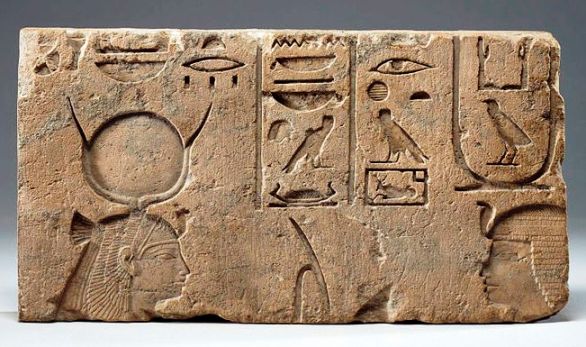
The goddess Hathor faces Pharaoh Necko II; the inscription above the goddess (left) may read ‘I grant you every country in submission.’ This would include the small country of Judah.
© Copyright 2006
Elizabeth Fletcher

